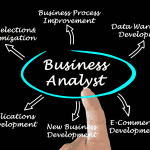Hiring a Business Intelligence Analyst to Grow Your Business? Understanding this role.
Are you looking to hire a business intelligence (BI) analyst? Here’s what you should know in our recruiter’s guide to hiring a business intelligence analyst and business intelligence job description, along with where to post a job for a top business intelligence analyst.
Every business owner wants their company to thrive. But how can you make that happen? One of the best ways is by using business intelligence—and how do you become a business intelligence analyst?
This recruiter’s guide to hiring a business intelligence analyst and job description discusses the field of business intelligence. This term may be new to you, but don’t worry; we will explain everything in this blog post. Business intelligence is gathering and analyzing data to help your company make better decisions.
Using BI, you can track your progress, identify opportunities, and make changes to improve your bottom line. So, how can you get started? Keep reading to find out!
What is Business Intelligence?
Business intelligence (BI) is a powerful business analytics product. It is the process of collecting, consolidating, and analyzing data, including predictive analytics, data visualization, and data analysis, to help business owners make more informed decisions. The data can come from various sources, including customer interactions, financial reports, and market research.
Once the data is collected and analyzed, BI tools can help business owners spot trends and patterns that might not be evident from simply looking at the numbers. This information can be used to make better strategic decisions, from product development to marketing campaigns.
Business intelligence tools can help automate data collection and analysis. This will free up your time to make decisions based on the insights you glean from the data.
How To Get Started With Business Intelligence (BI)?
The best way to get started with business intelligence (BI) is first to identify your business needs and objectives. What are you looking to track and measure? Once you have a clear idea of what you want to achieve, you can look for the right BI tool or software that will fit your specific requirements.
Several BI tools are on the market, so it’s crucial to research and find one with the right features to meet your needs scalably. You’ll also need to ensure that whoever implements the BI tool has the necessary expertise to use it effectively.
Once you have everything in place, take the time to configure and set up your BI system properly. This includes defining your data sources, setting up ETL processes, and creating dashboards and reports. Once everything is up and running, you can start using BI to track your KPIs and make better business decisions.
How Can a Business Intelligence Analyst Improve Your Business?
Business intelligence (BI) helps turn data into information that can improve business performance. BI can help you answer questions such as:
-How is my business performing compared to other companies in my industry?
-What are the most popular products or services on my website?
-Which marketing campaigns are generating the most leads or sales?
-What’s the average customer lifetime value for my business?
The answers to these and other essential business questions can help you make reliable, strategic decisions, optimize your operations, and improve your bottom line.
The Benefits Hiring a Business Intelligence Analyst
There are many benefits of using self-service Business Intelligence (BI). Here are some of the most important ones:
Better decision-making:
Business intelligence can give organizations a competitive edge by helping them make more informed decisions. By providing accurate and up-to-date information about market trends, customers, and competitors, BI can help businesses make informed decisions about where to allocate resources and how to respond to changes in the marketplace.
Improved operational efficiency:
Organizations that use BI tools can achieve significant improvements in operational efficiency. By streamlining decision-making processes and automating repetitive tasks, BI can help businesses save time and money.
A greater understanding of customer needs:
Business intelligence can also help businesses better understand customer needs and preferences. By analyzing customer data, companies can develop more targeted marketing campaigns and improve their overall customer service.
In today’s business world, having access to accurate and timely information is critical to success. Business intelligence tools can give organizations the insights they need to make better decisions, improve operational efficiency, and gain a deeper understanding of their customers.
How A Business Intelligence Analyst Can Optimize Your Operations
Now that you’ve gone through our recruiter’s guide to hiring a business intelligence analyst and business intelligence job description, here are some additional tips.
Many believe that business intelligence (BI) is only for big businesses. This couldn’t be further from the truth! Companies of all sizes can use BI to glean insights from their data and make better decisions for growth potential. Here are some tips on how you can use BI to its full potential in your business:
Define what success looks like for your business: What are your goals and objectives? What do you want to achieve? Once you have a clear idea of what you want to achieve, you can start looking at data to help you get there.
Collect data from all parts of your business: You need data to use BI. Collect data from every department and every level of your business. This will give you a comprehensive view of what’s happening and help you identify trends and patterns.
Use the right tools: Many different BI tools are available, so choosing the right one for your needs is vital. Research and talk to other businesses to see what they use and why.
Clean and organize your data: This is a crucial step! If your data is messy, making sense of it won’t be easy. Cleaning and organizing your data will make it much easier to work with and help you get better results.
Explore your data: Once your raw data is organized from multiple sources, it’s time to start exploring it. Look for trends and patterns to help you achieve your business goals in the data warehouse. Try different methods and approaches until you find something that works for you. Data mining tools will also help you with data analytics.
Take action: Insights from data are only helpful if you use them to make changes in your business. Use what you’ve learned to make decisions and take steps that will help your business grow.
Business intelligence can be a powerful tool for all business users. By following these tips, you can use BI to its full potential and achieve your business goals.
How To Find The Right Business Intelligence Analyst?
There are many people out there who claim to be experts in business intelligence. But how do you know if they’re the right person for the job? Here are some tips on how to find the right person to do your business intelligence:
Research their experience:
Research the experience of anyone you’re considering hiring for business intelligence. You want to ensure your hire understands the field and knows how to apply it to your specific needs. Try searching for their name online and reading reviews from past clients. If they have a blog or website, look at their content to see if it’s relevant and informative.
Check their qualifications:
Qualifications are another critical factor to consider when choosing a business intelligence expert. In addition to experience, you’ll want to ensure they have the necessary skills and knowledge for the job. Ask about their education and training, as well as any certifications or professional memberships they may have.
Consider their rate:
If hiring a consultant, you’ll also need to consider the cost of hiring a business intelligence expert. Rates can vary widely, so get quotes from several providers before deciding. Once you’ve compared prices, you can choose the option that fits your budget and needs.
These are just a few things to remember when looking for the right person to do your business intelligence. By doing your research and taking your time, you can be sure to find someone who will provide you with the insights and guidance you need.
As your business grows, you must use data to make informed decisions about where to allocate resources and how to continue growing. The term business intelligence is very powerful in all business operations. Business Intelligence Platforms can help you with online analytical processing.
Business intelligence tools can help you do just that. Using our recruiter’s guide to hiring a business intelligence analyst and business intelligence job description, along with some additional tips, you can automate the process of gathering and analyzing data to focus on making intelligent decisions for your company.
Are you looking to hire for a business intelligence role? PMWorld 360 Magazine’s job board has job packages to attract top talent. Register for a recruiter/employer account today and post your next job with us. Our audience comprises business leaders, project management professionals, and business intelligence experts.
PMWorld 360 Partner, IPM, Offers Online Project Management Certification:
PMWorld 360 Magazine partnered with the Institute of Project Management (IPM) to help employees grow and advance through certification in project management! Check out their courses and certifications.
Get More Career Insights From Our Career and Recruiting Blog
Our Project Management Magazine
For Project Management Best Practices: Articles, Podcasts, Templates, Calculators


